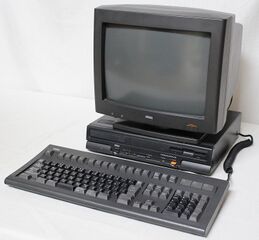Difference between revisions of "Teradrive"
From Sega Retro
Scarred Sun (talk | contribs) m (Text replacement - "Physical Scans" to "Physical scans") |
m (Text replacement - "[http://sega.jp/" to "[https://web.archive.org/web/*/http://sega.jp/") |
||
| Line 125: | Line 125: | ||
==External Links== | ==External Links== | ||
| − | * [http://sega.jp/fb/segahard/md/tera.html Sega of Japan catalogue page (Japanese)] | + | * [https://web.archive.org/web/*/http://sega.jp/fb/segahard/md/tera.html Sega of Japan catalogue page (Japanese)] |
{{MegaDrive}} | {{MegaDrive}} | ||
Revision as of 17:31, 26 March 2016

| |||||
| Teradrive | |||||
|---|---|---|---|---|---|
| Manufacturer: IBM, Sega | |||||
|
The Teradrive (テラドライブ) is a hybrid between a Sega Mega Drive and a full-featured IBM 286 computer, released to the Japanese market in early 1991. The system is fully integrated, with both the Mega Drive and PC components existing together on one motherboard. This sets the Teradrive apart from the only other known PC/Mega Drive hybrid system, the 386 Amstrad Mega PC, which added Mega Drive functionality via an ISA expansion card.
Contents
Hardware
Unlike the Mega PC, the Teradrive also allows some degree of interaction between the PC hardware and the Mega Drive hardware. The only known software to make use of this is a game called "Puzzle Construction", which was included with the Teradrive. This program features an editor which allowed a user to design and run puzzles from the PC. The game appears to make use of the Mega Drive components for sound, and may also make use of the VDP, but more likely it uses x86 code. Exactly how the x86 code communicates with the Mega Drive hardware, and the limits of what is possible through this interface, are currently unknown.
It is rumoured that the Teradrive shipped with a software development kit (SDK) for developing Mega Drive games, although this claim is currently unsupported. No known development software for the Teradrive exists. This rumour may have originated from misunderstanding or exaggeration of the features provided by the bundled "Puzzle Construction" software.
The Teradrive includes an expansion connector on the top of the unit, which provides the same functionality as the one on the Mega Drive. Although no Mega CD unit was ever released for the Teradrive, at least two prototype units were developed. Sega of Japan reportedly planned to release the Mega CD expansion for the Teradrive based on the top-loading design of the Mega CD II, but poor sales of the Teradrive caused the development to be cancelled before designs left the prototype stage, and Sega instead focused on the development of the Sega Saturn.
In late 1993, the concept of a hybrid PC/Mega Drive found its way outside of Japan in the form of the Amstrad Mega PC, although it was based on an entirely different design. The unit wasn't very successful regardless of market, and this was largely due to its high price (about US$3000). A souped-up version called the Mega PC Plus was later offered based on a 486DX-33 CPU machine with 4 MB of RAM, but very few seem to have made it out the door. The Teradrive and its successor have all but disappeared with the passage of time.
Teradrive Models
The Teradrive came in 3 different models with the main differences being RAM, Storage, and Price.
Model 1
- Processors: 10MHz Intel 80286, 7.61MHz (PAL) or 7.67MHz (NTSC) Motorola 68000, and 3.55MHz (PAL) or 3.58MHz (NTSC) Zilog Z80
- RAM Avail.: 640KB
- RAM Max.: 2.5MB
- Storage: 1 - Floppy Drive
- Graphics Modes:
- PC Mode
- 640x480 (262144 colors/16 onscreen)
- 320x200 (262144 colors/256 onscreen)
- Mega Drive Mode
- 320x224 (512 colors/64 onscreen)
- PC Mode
- I/O Ports
- PC
- 1 - VGA
- 1 - Parallel
- 2 - Serial
- 2 - PS/2
- Mega Drive
- 2 - Mega Drive Controller Ports
- 1 - Expansion (this would be used to attach the Mega-CD)
- PC
- Operating System: IBM DOS J4.0/V
- Price ¥148,000 ($1100, €790)
Model 2
- Processors: 10MHz Intel 80286, 7.61MHz (PAL) or 7.67MHz (NTSC) Motorola 68000, and 3.55MHz (PAL) or 3.58MHz (NTSC) Zilog Z80
- RAM Avail.: 1MB
- RAM Max.: 2.5MB
- Storage: 2 - Floppy Drive
- Graphics Modes:
- PC Mode
- 640x480 (262144 colors/16 onscreen)
- 320x200 (262144 colors/256 onscreen)
- Mega Drive Mode
- 320x224 (512 colors/64 onscreen)
- PC Mode
- I/O Ports
- PC
- 1 - VGA
- 1 - Parallel
- 2 - Serial
- 2 - PS/2
- Mega Drive
- 2 - Mega Drive Controller Ports
- 1 - Expansion (this would be used to attach the Mega-CD)
- PC
- Operating System: IBM DOS J4.0/V
- Price ¥188,000 ($1400, €1020)
Model 3
- Processors: 10MHz Intel 80286, 7.61MHz (PAL) or 7.67MHz (NTSC) Motorola 68000, and 3.55MHz (PAL) or 3.58MHz (NTSC) Zilog Z80
- RAM Avail.: 2.5MB
- RAM Max.: 2.5MB
- Storage: 1 - Floppy Drive, 1 - 30MB Hard Drive
- Graphics Modes:
- PC Mode
- 640x480 (262144 colors/16 onscreen)
- 320x200 (262144 colors/256 onscreen)
- Mega Drive Mode
- 320x224 (512 colors/64 onscreen)
- PC Mode
- I/O Ports
- PC
- 1 - VGA
- 1 - Parallel
- 2 - Serial
- 2 - PS/2
- Mega Drive
- 2 - Mega Drive Controller Ports
- 1 - Expansion (this would be used to attach the Mega-CD)
- PC
- Operating System: IBM DOS J4.0/V
- Price ¥248,000 ($1840, €1400)
Gallery
Promotional Material
JP TV advert
Physical scans
| Mega Drive, |
|---|
|
External Links

